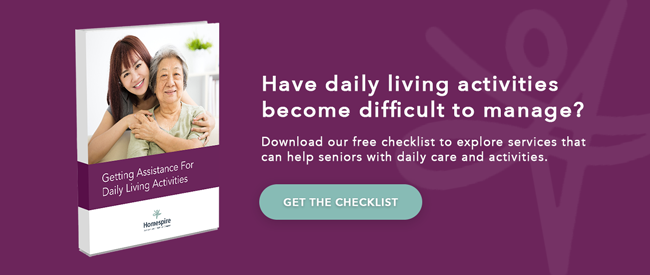You’ve started to see a few alarming signs that perhaps your aging parent may need support with activities of daily living (ADLs), maybe it’s preparing a few nutritious meals or help with mobility. What they want is to age in place like 90% of seniors who prefer to stay in their own homes but how can you help them when your own fears kick in — can they? Is it safe? What should you know or look for to help them age in place? Download the ‘Getting Help with Activities of Daily Living Checklist.’
How to know if aging in place is right for you
How to know if aging in place is right for you
By Unknown
Updated
5 minute read
Starting the conversation with aging parents
When small health issues arise, instead of telling you they are concerned, seniors tend to brush it aside and figure it out on their own. Until of course something major happens like a fall or they take medications incorrectly sending them to the ER. Which happens more often than not. Stubborn? Maybe but it probably has more to do with fear of losing their independence.
It’s important to stress with older loved ones, needing help doesn’t mean you can’t age in place. When Edna was 81, her family popped in for a visit. They were shocked at what they saw. She was sitting in her favorite chair getting ready to watch the ballgame as she did every night. Empty TV dinner containers were scattered around, along with her pillow and blanket nearby on the coach. After spending a few moments catching up, they noticed she seemed quick to talk, very unlike her. The problem? She had to use the bathroom but her arthritis pain was so severe she couldn’t go up the stairs. That’s when they saw the makeshift bedpan in the sink. The realization came hard, she needed help using the bathroom and getting her strength back. Once it was out in the open, a plan was put into place and now she’s aging in place exactly as she wants.
How to know when you need support
Daily living activities are one of the most affected issues of aging and one of the most difficult to address between seniors and their family members. Have you spotted a few already that have you concerned? Determining if they need help with ADLs is a starting point when it comes to helping seniors get the right support to age in place and inspire a safe, healthy way to live independently at home.
- Have you noticed dad having a hard time getting up and out of his favorite chair?
- Are they always wearing the same clothes every time you come to visit them?
- Do they have a few new scrapes or bruises but brush them aside blaming clumsiness?
- Are they able to keep their hair neat or beard clean shaven?
- Is their house starting to become cluttered with dust or piled up mail/garbage?
- Can they go to the grocery store and cook on their own?
- Do they seem steady enough to safely get in and out of the shower?
Download the checklist ‘Getting Help with Activities of Daily Living’ to see if aging is right for your loved one and next steps on what you can do to help them achieve their goal of staying home.
If you have immediate concerns, don’t wait until a health crisis hits, reach out to Homespire Life Care Managers (registered nurses) right now for advice and guidance to help your aging loved one stay healthy and independent for as long as possible.
